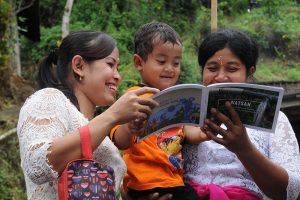
Access to Clean Water
PT HM Sampoerna TBK

The program had been based on one of the company’s values of three-hand philosophy: to benefit society at large. This had also been in line with the government’s 2015-2019 National Mid-Term Development Plan (RPJMN) and President Joko Widodo’s Nine Agenda Priorities called Nawacita.
INTRODUCTION
In 2015, PT HM Sampoerna Tbk, in cooperation with IDEP Foundation, had initiated the “Access to Clean Water” program in Gobleg Village in Banjar and Selat Village in Sukasada, Buleleng, Bali in 2015-2016.The program had benefitted 13,000 beneficiaries in the areas, including clove farmers. The objectives of the “Access to Clean Water” program are as follows:
- To facilitate the clove farmers with access to water for irrigation;
- To provide good sanitation facilities for the communities.
Accordingly, the program had been implemented to resolve this issue. Proper irrigation will contribute 20 to 30 percent towards production success, according to a research conducted by Indonesia’s Ministry of Agriculture.
In addition to irrigation, clean water is also vital for the improvement of the public health and mitigation of diseases. Dermatitis, a skin-related disease, is considered by Buleleng’s Health Agency to be one of the top ten diseases.
FRAMEWORK AND STRATEGY
The 12-month program had been divided into two phases:- The construction of water management and sanitation facilities;
- Water distribution
Meanwhile, a water shelter tank equipped with a hydraulic pump had been built to distribute water effectively. HDPE PN 100 (75mm) piping system had been installed for about 1,000 meters in length to maximize the system, considering the higher durability and flexibility of the pipe material.
In order to ensure the cleanliness and quality of water distribution, a filtration tank had been attached to each installation of the piping and water tank systems.
The program had been based on one of the company’s values of three-hand philosophy: to benefit society at large. This had also been in line with the government’s 2015-2019 National Mid-Term Development Plan (RPJMN) and President Joko Widodo’s Nine Agenda Priorities called Nawacita.
This program had been unique in that the local communities in the two villages had been involved in the construction phase in order to raise their sense of belonging to the facilities. The women group had been working hand in hand to provide foods and the clove farmers had volunteered to carry out the materials.
ACHIEVEMENT AND IMPACT
The program had made an impact on the communities in the two villages. According to Buleleng’s Statistic Agency, the productivity of the clove farmers in Goblek Village had increased from 180 tonnes in 2015 to 195 tonnes in 2016.Meanwhile, the clove farmers in Selat Village had increased their productivity from 248 tonnes in 2015 to 251 tonnes in 2016.
FUTURE DIRECTION
Following the success story in Buleleng, the company has been continuing to replicate and expand it further in other areas with similar issues.Currently, the 105-year-old company, in cooperation with IDEP Foundation, has initiated a program that facilitates an access to water, sanitation and health, and provides education to the communities in East Sumba and East Nusa Tenggara to improve their quality of life.
The program, which provides basic sanitation with appropriate sanitation facilities, has now been extended for a settlement with semi open-space community toilets and washing facilities, complete with a Wastewater Garden System. In Klungkung, Bali, the program has been expanded through the exploitation of perennial plants and implantation of 1,000 bio-shield trees, the use of supporting environmental protection and disaster risk mitigation, and the added value of the local communities’ environmental awareness.
The program has benefitted 70 families and 560 people in the targeted areas.

Sampoerna – an affiliate of PT Philip Morris Indonesia and part of Philip Morris International Inc. – is the leading Indonesian tobacco company, focusing primarily on the production and sale of clove cigarettes. Sampoerna operates seven production facilities in Java, employing – directly and indirectly -- a total of approximately 68,000 employees, mostly in the production of hand-rolled clove cigarettes. Sampoerna distributes its products via 104 sales and distribution area offices across Indonesia.




